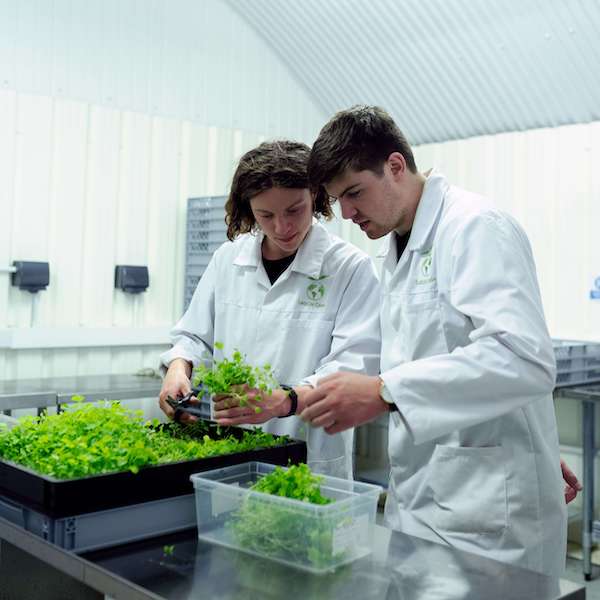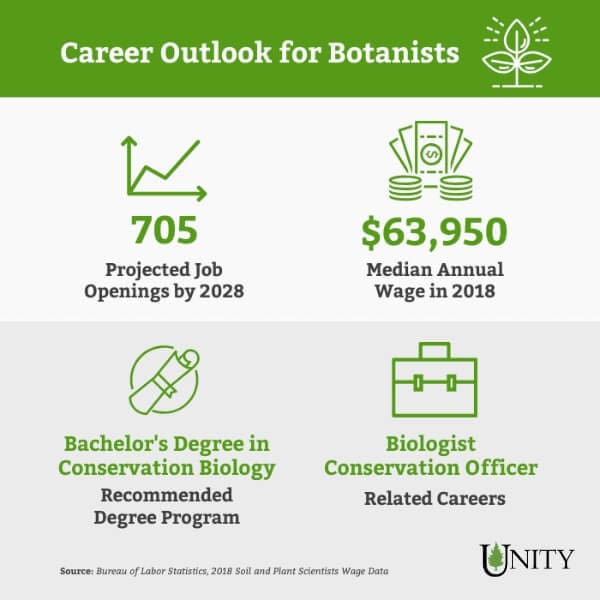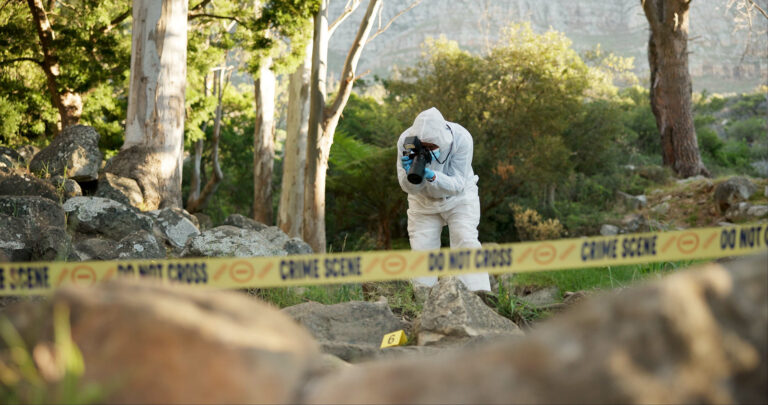
Given that plant life is constantly changing and that now, more than ever, the environment is at the forefront of global research and discussion, the field of botany is expanding. If you have thought, “I want to be a botanist, but what does it take?” now is an excellent time to explore this question.
A botany degree is lucrative not only because the field is growing, but also because it qualifies a person for other fields should they ever wish to change career paths.

What Is A Botanist?
A botanist is one who studies plant life. Botanists – formerly known as botanologists – have been around since ancient Greece; over 2,300 years ago. This field of study is far-reaching and necessary to science and society.
Their research has improved the building blocks of society; our supply of medicines, foods, fibers, and building materials. Botanical knowledge is also used by conservationists to manage all public lands. Today, botany is relied on by public health and environmental protectionists to combat pollution.
What Does a Botanist Do?
What a botanist does depends on their area of specialization. Botanists study a wide range of topics. They don’t all spend their days collecting plant samples or performing obscure research in remote areas (although, a few do).
What all botanists do have in common is that they are avid problem solvers with a desire to understand the importance of plants in our lives.
Botanist Skills
Botany is a science that requires a certain skill set, including:
- Research and analytical skills
- Critical evaluation skills
- Communication skills
- Attention to detail
- Logical thinking
Aside from the skills required to be a botanist, there are really just two required personal attributes: First, botany requires problem solvers. The environmental problems that we currently face are just one genre of the problems botanists look to solve. Second, botany requires patient people. The scientific process cannot be rushed.
Duties of a Botanist
There are a variety of jobs a botanist can have, which means their daily duties may look very different. There are some common duties that most botanists can expect:
- Studying plants
- Conducting fieldwork
- Testing plants and analyzing responses
- Working with others
- Managing research groups and resources
Entry-Level Botanist Job Description
To get a feel for what career growth in this field looks like, consider the difference between entry-level and senior-level positions. A botany field assistant is an example of an entry-level position.
Entry-level botanist duties include:
- Participate in fieldwork for floristic surveys, demographic monitoring, seed collection, and restoration, and transcribe into a database
- Responsible for assigned aspects of specimen and sample processing including tissue samples, seed collections, and aquatic invertebrates
- Responsible for assigned aspects of collecting natural history collections including taking detailed field notes and pictures of plant habitats, transcribing field notes to the proper database, creating labels and matching them with specimen
- Responsible for assigned aspects of plant identification in the field and herbarium
- Responsible for assigned aspects of day-to-day natural history collection tasks including specimen processing
- Assist with digitization projects of herbarium specimens
- Maintain satisfactory work relationships
- Maintain a positive, solution-oriented demeanor
Senior-Level Botanist Job Description
An example of a senior-level job in botany is being a botanist for the USDA. Contrast this with the entry-level job description and you’ll see how much room there is for career growth.
This advanced botanist role requires that individuals…
- Oversee the development and implementation of strategies for the region’s botany program
- Serve as the primary assistant to the Director of Wildlife, Fish, and Rare Plants in creating regional policies and objectives.
- Coordinate with state agencies, administers grants to states, and tracks funds for reimbursement to states for projects
- Provide recommendations to forests in identifying alternatives to resolve project conflicts involving TES plants and/or invasive species.
- Travel 2-3 times a month
Where Do Botanists Work?
Plant explorers who enjoy the outdoors may study the effects of pollution, working toward environmental protection. They also might work to identify new plant species by finding out what their properties are and how they may be useful.
There are countless organizations involved in this type of work in the private sector, as well as governmental agencies. Universities and research institutions hire botanists as teachers and researchers.
Governmental agencies:
- Environmental Protection Agency
- Public Health Service
- NASA
- U.S. Forest Service
- U.S. Department of Interior
- USDA
Botany field options include:
- Botanical Gardens
- Arboretums
- Zoos
Plant-related industries:
- Biological Supply Houses
- Biotech Firms
- Chemical / Oil Industry
- Pharmaceutical
- Greenhouses
- Food companies
- Animal Inspection
From all these options, one can conclude that a day in the life of a botanist can mean a number of things. A degree in botany will not limit your career options.
Working Environment
There is a wide range of opportunities available to a botanist. Many jobs have commonalities in their work environment. Most jobs will require some amount of travel.
For those who work outside, a workday may not be the typical nine to five. For those who work in labs and offices, however, traditional business hours can be expected. Due to the research-oriented nature of many jobs in botany, collaborating with others is also expected.
Job Satisfaction
Botanists tend to work in specialized fields that require research and a passion for the work, which is why job satisfaction is so high. Further benefits are found in independence, stimulating work environment, travel opportunities, and beautiful surroundings.
What is the Average Botanist Salary?
A common question is, “How much does a botanist make?” According to the BLS, the median salary for botanists was $63,950 annually in 2018.

The charts below are based on the Bureau of Labor Statistics data for plant scientists. They cover the top-paying industries for botanists, the top-paying states, and those with the highest employment.
Entry-Level Botanist Salary
It takes time to build up to a career that pays 6 figures. An entry-level position, like an intermediate research technician, will earn $33,000 per year and a school teacher will earn $44,200 per year.
Senior Botanist Salary
Especially within the research field, salaries for senior-level botanists reach 6 figures quite often.
Research section heads make $108,387 per year. Research managers make $139,000, and research vice presidents/directors make $142,000. If you put the work in, botany will reward you.
What Is the Outlook for Botanists?
Job prospects and field growth for botany as a whole looks steady and strong. According to the Bureau of Labor Statistics, opportunities for plant scientists have grown since 2012 and will continue to grow through to 2022 at a rate of 8% to 14%.
Botanist Education Requirements
What does a botanist study? Where do they learn how to study plants? A four-year botany degree is the base requirement for becoming a botanist.
How long does it take to become a Botanist?
How many years to become a botanist depends on your ultimate trajectory. If you don’t intend to do research, a four-year degree will do. A Ph.D. is necessary for research and teaching positions at a college, which requires eight-years of schooling.
Don’t get hung up on where to study botany. Just keep in mind that undergraduate research opportunities plus a year or more of work experience will give you an edge on the competition as a candidate when you graduate. If you continue education after undergraduate, choose a graduate school based on your research interests.
Botanist High School Recommendations
There are ways to get a leg up in education if you’re interested in botany from a young age. If AP or college courses are available in English, Math, Chemistry, Physics, and Biology, take advantage of those.
Extracurricular activities that stand out are science fairs and clubs. If you can get a job that is related to plants/biology (parks, greenhouses, farms, landscaping), that is also encouraged.
Botanist College Education Requirements
To become a botanist, a college degree is required, as most botanists have bachelor’s degrees. A Wildlife Conservation major with a focus on botany is also widely recommended.
Coursework in topics like plant ecology, plant anatomy, plant molecular biology, ecosystems, cell biology, plant development biology, and environmental biology is advisable.
Keep your field of interest in mind; your coursework should reflect that.
Additional Certifications and Licenses
For those who wish to go into specialized areas of botany that don’t require continued education, there are extra certifications they can get, which greatly enhances their botanist qualifications.
A certified botanist will have an edge on their competitors who haven’t attained specialized certifications.
- The Native Plant Trust is a New England based program that provides basic and advanced certificates for specializations like native plants, horticulture and design, and botany and conservation.
- The California Consulting Botanist Certification offers two options; field certification and consulting certification. These guarantee a botanist has top-notch knowledge and experience and utilizes sustainable practices.
How to be a Botanist: Start With A Degree From Unity Environmental University
If plants and their potential are your passion, and you’re a team player looking for a fulfilling career, then botany may be for you. Botany is an influential field of study and, although it has always been important, it now has the capability to change the world as we know it.



